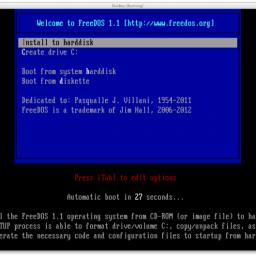
Who cares that it's 20 years old:
FreeDOS is still around, fulfilling an interesting and valuable role in the world of tech, and what's more, is ardently supported and appreciated by a loyal core of users and developers. Sean Gallagher over at Ars Technica interviews the FreeDOS lead developer, Jim Hall, to find out why FreeDOS still fills a niche:
Because FreeDOS is, as some have called it, "barely an operating system," it allows developers to get very, very close to the hardware. Most modern operating systems have been built specifically to avoid this for security and stability reasons. But FreeDOS has become much more friendly to virtualization and hardware emulation-it's even the heart of the DOSEMU emulator
The direction the project has taken hasn't exactly followed the road map Hall envisioned after version 1.0. He once had ambitious plans for a next-generation of DOS, originally envisioning a modern FreeDOS along the lines of an alternative history of computing. "For a while, I was thinking, 'If MS DOS survived, where would DOS have gone in the last 10 to 15 years?'" Hall said. "I was advocating some sort of multitasking-we could have task switching like what was supported in the 286, where you can put one process to sleep while you do another process. I wanted to have TCP/IP added to kernel."
FreeDOS might hail from the era before networking but it's inherently real-time, provides a great teaching tool that allows you to get close to the bare metal, and remains deliciously uncomplicated.
That's also the opinion of Gallagher, who spent a whole day {gasp!} running DOS just to remember what it's like. Now get offa my lawn.
 Who cares that it's 20 years old: FreeDOS is still around, fulfilling an interesting and valuable role in the world of tech, and what's more, is ardently supported and appreciated by a loyal core of users and developers. Sean Gallagher over at Ars Technica interviews the FreeDOS lead developer, Jim Hall, to find out why FreeDOS still fills a niche:
Who cares that it's 20 years old: FreeDOS is still around, fulfilling an interesting and valuable role in the world of tech, and what's more, is ardently supported and appreciated by a loyal core of users and developers. Sean Gallagher over at Ars Technica interviews the FreeDOS lead developer, Jim Hall, to find out why FreeDOS still fills a niche: